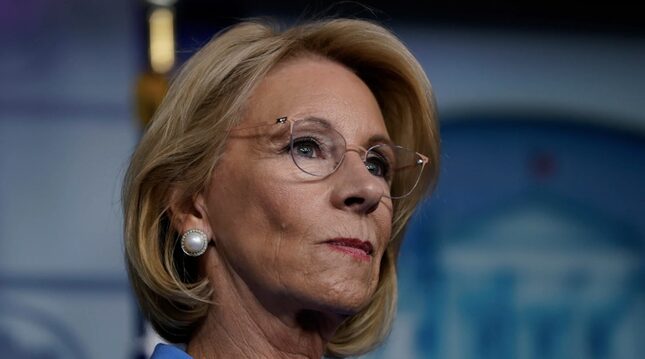Judge Upholds Betsy DeVos's Horrible Title IX Changes
Politics

A federal judge has allowed the Department of Education to proceed with new rules regarding how university campuses respond to sexual assault complaints, which include expanded rights for the accused, a restricted definition of sexual harassment, and a narrower scope of cases schools must investigate.
Attorneys general across 17 states and D.C. filed a suit challenging the changes, saying that the policy would prevent schools from investigating some sexual abuse complaints, in addition to discouraging students from reporting assaults.
But U.S. District Judge Carl Nichols dismissed their concerns, writing that “Plaintiffs are free to investigate and punish as violations of their codes of conduct or of state law behavior that does not meet the new definition of sexual harassment under the Final Rule.”
Betsy DeVos, the architect behind the changes, declared that the ruling represented “yet another victory for students and reaffirms that students’ rights under Title IX go hand in hand with basic American principles of fairness and due process.”
Specifically, DeVos’s changes include new guidelines that will require both survivors and the accused to be “cross-examined” in live hearings to “challenge their credibility.” Schools will also no longer be required to monitor sexual harassment claims outside their direct purview, meaning that if it didn’t happen at a school-sanctioned function, the school won’t have to pursue official Title IX investigations.
The definition of sexual harassment will also be narrowed to “unwelcome conduct determined by a reasonable person to be so severe, pervasive, and objectively offensive” that it denies the victim access to a school’s education programs or activity.
The new rules will take effect Friday. The American Council on Education, which supported the challenge, wrote in a June legal brief about the absurdity of ordering a “sea change” for colleges with less than three months to implement it.
“In the best of times, that deadline would be unreasonable. But in light of the extraordinary burdens that have been placed on American colleges and universities in the wake of the COVID-19 global pandemic, that August 14 implementation deadline is problematic in the extreme,” they wrote.